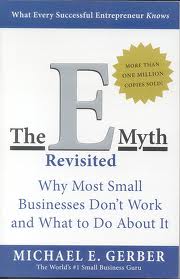 Back in college I took a marketing class that recommend The E-Myth Revisited by Michael Gerber as additional/optional reading material. I hadn't heard of it much besides that, but I kept it on my list for a while anyways. After seven years, I decided to finally give it a try. I found the book interesting and quite different from the entrepreneurship texts that have been become "popular" recently. It takes a much more "back to basics" approach and actually talks about how owners can make their businesses more predictable and better operationally by picking up some lessons from McDonald's. At first I was skeptical, but then I got the point. The "business development process" and the "business model franchise/prototype" approach actually seems like a good idea after reading the entire book about it. In a nutshell, it's about doing intense experimentation and optimization of every component of a business model in order to find what works and removes the owner and his or her whims from the picture as much as possible. I found a lot of parallels between this book and lots of what Steve Blank and Alex Osterwalder write about the business model canvas. Most of the book's examples were about retail establishments selling products. I'm curious how the book's lessons apply to service businesses, especially ones where talent and thinking are most of the product. The author said businesses should try to set themselves up so that systems run the show and you can hire the lowest skilled people possible; I'm wondering how whether that's valid across all types of businesses. I also found the book to be much more about life and figuring out what you want (and following your spirit and your own personal values) just as much as it is about business techniques (some of the scripts and hiring practices in the book were nice and tangible techniques that are directly applicable). I also liked how the author spoke (essentially) of gamification of the enterprise (that word wasn't around when he wrote this, but his observations are exactly its essence). I did find that at times the book was a bit too sales-y (in terms of promoting the author's consulting business), but it wasn't blatant. I recommend this book to anyone who's been heavily into all the lean startup stuff and wants a different perspective on things, and I'm curious what others think as well. Intro
Part 1 e-myth and small business in America Ch 1 entrepreneur myth
Ch 7
Ch 10 biz Dev process
1 Comment
8/19/2013 04:13:24 pm
Thanks for this interesting book review. I also didn’t know much about the book. I think The E-Myth Revisited by Michael Gerber is really an added advantage for those who are doing their studies in marketing. I think this post has reduced my work to tell my friends about the book and i will tell them to have a read at this.
Reply
Your comment will be posted after it is approved.
Leave a Reply. |
Archives
February 2023
Categories
All
Subscribe |
 RSS Feed
RSS Feed

